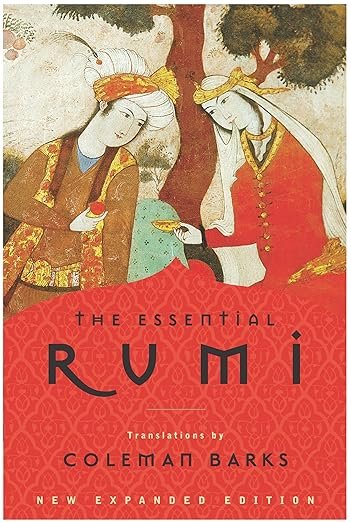Introduction to Rumi
Jalāl ad-Dīn Muhammad Rūmī, widely known as Rumi, stands as one of the most prominent figures in the realm of poetry and Sufism. Born on September 30, 1207, in the town of Balkh, situated in present-day Afghanistan, Rumi’s early years were marked by profound transitions. During political turmoil and Mongol invasions, Rumi’s family relocated, eventually settling in Konya, which is now part of modern-day Turkey. This move significantly shaped his intellectual and spiritual development.
The Great Sufi Poet and Mystic
Rumi’s poetic and mystical works transcend geographical and cultural boundaries, leaving an indelible mark on readers and seekers worldwide. As a Sufi mystic, his teachings center on love, unity, and the divine essence that pervades all existence. His ways of thinking continue to inspire countless individuals across diverse religious and cultural backgrounds, making his legacy both timeless and universal.
Through his writing, Rumi explores the intricate relationship between the human soul and the divine, emphasizing the importance of inner transformation and self-awareness. His seminal work, the “Mathnawi,” often referred to as the “Quran in Persian,” consists of over 25,000 verses that delve into philosophical, theological, and spiritual themes. These works not only illustrate his profound understanding of the human condition but also his unique ways of thinking, which seamlessly blend elements of poetry, myth, and spiritual wisdom.
Rumi’s enduring appeal lies in his ability to speak to the universal human experience, bridging divides of language, culture, and creed. His profound insights and lyrical expressions continue to resonate with people today, fostering a deeper appreciation for the interconnectedness of all beings. As we explore his life, teachings, and the lasting impact of his work, we come to see why Rumi remains a beacon of spiritual enlightenment and poetic brilliance across centuries.
Step into the world of learning and personal growth with the Centre of Excellence!
Early Life and Background
Jalal ad-Din Muhammad Rumi, often referred to merely as Rumi, was born on September 30, 1207, in the city of Balkh, which is presently located in Afghanistan. This period marked a significant era marked by socio-political turmoil due to the impending Mongol invasions that swept across Central Asia. Rumi’s early environment was heavily influenced by his father, Baha’ud-Din Walad, a prominent theologian and mystic of the time. Baha’ud-Din, also known as the “Sultan of the Scholars,” was a pivotal figure whose philosophical teachings deeply impacted Rumi’s intellectual formative years and shaped his early ways of thinking.
The escalating threat of the Mongol conquerors forced Rumi’s family to seek refuge elsewhere. Their exodus led them on an arduous journey, traversing the expansive cultural landscapes of Persia and the Middle East. The Walad family experienced various eclectic cultures and intellectual traditions, which added layers to young Rumi’s developing ideas. Eventually, they settled in Konya, a city in modern-day Turkey, where the family found a new home and a conducive environment for their spiritual pursuits.
The historical and cultural landscape during Rumi’s upbringing was markedly rich and complex. The imminent threat of the Mongol invasions catalyzed significant migrations and the fusion of diverse cultural elements. As Baha’ud-Din Walad established himself in Konya, he continued to disseminate his mystical teachings, attracting a following that appreciated his depth of knowledge and spiritual insight. Under his father’s tutelage, Rumi was immersed in both scholarly and mystical traditions from a young age, which later fortified his own spiritual and poetic journey.
In this vibrant intellectual environment, Rumi’s childhood was spent assimilating various philosophical paradigms and mystical ways of thinking. This unique upbringing, against the backdrop of a dynamically changing world, played a crucial role in shaping Rumi’s legacy as a beacon of spiritual literature and Sufi mysticism.
The Essential Rumi, New Expanded Edition
There’s a certain magic to poetry, and ‘The Essential Rumi, New Expanded Edition’ is a treasure trove of wisdom that dances beautifully across the pages. You’ll find yourself irresistibly pulled into Rumi’s enchanting world, where the ordinary becomes extraordinary.
Education and Spiritual Development
Rumi’s profound influence on literature and spirituality is rooted in his early education and the spiritual guidance he received throughout his life. Born in 1207 in Balkh, present-day Afghanistan, he was initially educated by his father, Baha’ud-Din Walad, a revered theologian and jurist. Under his father’s tutelage, Rumi delved into religious studies, acquiring a deep understanding of Islamic theology, Quranic studies, and jurisprudence. This foundational education played a crucial role in shaping Rumi’s ways of thinking and his later works.
Following the death of his father, Rumi continued his formal training under the guidance of prominent scholars and mystics of the time. One significant figure in his education was Burhan al-Din Muhaqqiq, a Sufi mystic, who introduced Rumi to the intricacies of Sufism. Under Burhan al-Din’s mentorship, Rumi’s ways of understanding spirituality deepened, and he began to integrate mysticism into his religious practices and philosophical thoughts.
During his formative years, Rumi also immersed himself in Persian literature, which significantly influenced his poetic expressions and modes of thinking. The works of classical Persian poets and thinkers such as Attar and Sanai provided Rumi with a rich literary and spiritual framework. These experiences honed his ability to convey profound spiritual truths through eloquent poetry.
Key moments in Rumi’s spiritual development include his encounters with Shams of Tabriz, a wandering mystic, whom Rumi regarded as his spiritual mentor. This relationship ignited a transformative period in Rumi’s life, leading to an outpouring of poetic creativity and mystical insight. The conversations and spiritual fervor shared with Shams profoundly impacted Rumi’s contemplative and poetic dimensions, further refining his ways of thinking.
In summary, Rumi’s education and spiritual development were marked by a blend of rigorous religious studies, literary exploration, and deep mystical experiences. The foundational role of Islamic theology and Persian literature, coupled with the guidance of eminent scholars and mystics, crafted a unique framework that shaped Rumi’s unparalleled contributions to Sufi poetry and spiritual thought.
Meeting Shams of Tabriz
One of the most transformative moments in the life of Rumi, the esteemed Sufi poet and mystic, was his meeting with Shams of Tabriz. Shams, an enigmatic dervish and wandering mystic, held unconventional views that challenged orthodox Islamic thought. This fateful encounter, which occurred in 1244, drastically altered Rumi’s ways of thinking and redirected the course of his spiritual and poetic endeavors.
Known for his profound spiritual insight and fervent quest for divine truth, Shams of Tabriz became both a friend and spiritual mentor to Rumi. This mentor-disciple relationship was intense and all-encompassing, leading to Rumi’s departure from his previous scholarly, structured lifestyle into a realm of ecstatic, experiential mysticism. Shams’ penetrating questions and provocative teaching style ignited a spiritual awakening in Rumi, deeply influencing his ways of thinking about God, love, and the nature of the soul.
The depth of their connection is evident in the transformational shift in Rumi’s poetry. Before meeting Shams, Rumi’s works were primarily academic and theological. Post-encounter, his poetry evolved to become more emotionally charged and spiritually profound, as evidenced in his renowned collection, the “Divan-e Shams-e Tabrizi.” This body of work, dedicated to his beloved mentor, reflects the passionate yearning and divine love that Shams of Tabriz had awakened within him.
However, their relationship was not without turmoil. The intensity of their bond and the radical nature of Shams’ teachings attracted both admiration and envy. Following a period of societal pressure and personal conflicts, Shams mysteriously disappeared, an event that deeply affected Rumi. Bereft, Rumi poured his grief and longing into his poetry, further solidifying his legacy as an exceptional poet whose works articulate the complexities of human emotion and divine ecstasy.
In summary, the encounter with Shams of Tabriz marked a pivotal point in Rumi’s life. Shams’ influence was instrumental in shaping Rumi’s spiritual journey and creative output, leaving an indelible mark on his legacy. This profound relationship illuminated new ways of thinking about mysticism and poetry, propelling Rumi to the heights of literary and spiritual fame that he is celebrated for today.
Step into the world of learning and personal growth with the Centre of Excellence!
Major Works and Themes
Rumi’s literary corpus is vast, with his major works including the “Masnavi” (Mathnawi) and the “Divan-e Shams-e Tabrizi” standing out as monumental achievements in Sufi literature and Persian poetry. The “Masnavi,” often regarded as Rumi’s magnum opus, consists of six books that intricately weave together stories, poems, and treatises on spiritual wisdom. Written in rhyming couplets, the “Masnavi” is lauded for its narrative structure that seamlessly integrates allegorical tales with profound philosophical and mystical reflections.
The “Divan-e Shams-e Tabrizi,” named after Rumi’s spiritual mentor Shams, is a collection of lyric poems, or ghazals, that captures the ecstatic and deeply personal facets of divine love and longing. In these works, themes of love, unity with the divine, and the human experience are recurrent, offering readers a multifaceted exploration of spirituality through the lens of intensely personal emotion and universal truths.
One of the central themes in Rumi’s works is the concept of love, often interpreted as an overwhelming and transformative force that transcends the mundane to connect the seeker with the divine. Rumi’s eloquent verses speak to the heart of this spiritual journey, exemplified by his famous couplet, “The wound is the place where the Light enters you.” Such lines illustrate how personal suffering and longing are seen as catalysts for spiritual awakening and union with a higher power.
Another pivotal theme is the idea of unity and interconnectedness. Rumi employs a variety of narrative forms, parables, anecdotes, and direct discourse to convey the message that all creation emanates from and returns to a singular divine source. This thematic thread is encapsulated in the verse, “You are not a drop in the ocean. You are the entire ocean in a drop.” Here, Rumi emphasizes the interconnected nature of existence, wherein every individual reflects the infinite.
Rumi’s works reflect a unique blend of storytelling, poetry, and spiritual guidance, making them timeless and universally appealing. His ability to craft verses that resonate across different cultures and eras underscores his profound understanding of the human condition and the divine mysteries. Through the structures, themes, and poetic beauty of his works, Rumi continues to inspire readers to explore new ways of thinking about love, spirituality, and our collective human experience.
The Essential Rumi, New Expanded Edition
There’s a certain magic to poetry, and ‘The Essential Rumi, New Expanded Edition’ is a treasure trove of wisdom that dances beautifully across the pages. You’ll find yourself irresistibly pulled into Rumi’s enchanting world, where the ordinary becomes extraordinary.
Philosophy and Teachings
Rumi’s philosophical and spiritual teachings, anchored in the profound traditions of Sufism, reveal a sophisticated understanding of the soul’s journey toward the Divine. Central to his teachings is the concept of the soul’s relentless quest to reunite with its source, God. This mystical voyage underscores Rumi’s belief in the importance of inner spiritual development, a theme he eloquently explores through his poetry and prose.
Love and compassion are pivotal elements in Rumi’s teachings, serving as both the means and the end of the soul’s journey. For Rumi, love is a divine force that transcends ordinary existence, fostering a direct, personal connection with God. It is through experiencing and embodying this ethereal love that one can attain true spiritual enlightenment. Compassion, as an extension of this divine love, emphasizes the value of selflessness and empathy in nurturing the soul and fostering a profound sense of interconnectedness among all beings.
Rumi also speaks of the ‘universal soul,’ a notion that reflects the interconnectedness of all individual souls with the divine essence. This concept challenges the illusion of separateness, advocating for a realization of unity and oneness with the divine. His teachings, deeply rooted in the Sufi principles of asceticism and mysticism, encourage a life of simplicity, inward reflection, and personal spiritual experiences that surpass rigid religious formalities.
Remarkably, Rumi’s philosophy transcends religious and cultural boundaries, offering a universal message that resonates with diverse audiences. His emphasis on the essential human experiences of love, compassion, and the quest for divine unity serves as a timeless guide, inviting individuals from all backgrounds to embark on their spiritual journeys. Through his profound insights and universal appeal, Rumi continues to inspire and uplift souls, illuminating the ways of thinking that lead toward inner peace and divine harmony.
Legacy and Influence
Rumi’s legacy is a testament to the timeless impact of his profound works on literature, spirituality, and popular culture. Reaching far beyond the confines of the 13th century, Rumi’s ideas and poetic expressions have perpetually influenced an array of subsequent poets, writers, and philosophers. His unique ways of thinking have seamlessly integrated into various cultural and intellectual landscapes.
Rumi’s influence on literature is particularly notable. Countless poets and writers, spanning different eras and regions, have drawn inspiration from his mystical verses and philosophical discourses. His ability to weave intricate ideas about love, existence, and spirituality into poetic forms has continuously captivated literary minds, serving as a perennial source of inspiration and reflection.
The translation of Rumi’s works has played a pivotal role in their widespread acclaim, especially in the Western world. Renowned translators such as Coleman Barks have rendered Rumi’s Farsi texts into English, making his spiritual insights and poetic eloquence accessible to a broader audience. These translations not only preserve the essence of his original ideas but also resonate deeply with contemporary readers, further cementing Rumi’s global relevance.
In the realm of spirituality, Rumi’s influence extends across various spiritual traditions. His ideas of divine love, unity, and the transcendence of the ego have inspired contemporary thinkers and movements that seek to bridge gaps between different cultures and belief systems. Rumi’s inclusive ways of thinking invite a universal approach to understanding spirituality, fostering a sense of interconnectedness and mutual respect among diverse communities.
Furthermore, Rumi’s legacy permeates popular culture, from music and dance to visual arts. His profound thoughts and lyrical beauty have inspired countless artistic expressions, embodying the timeless and unifying messages of his work. As contemporary society continues to explore and embrace his visionary ideas, Rumi remains a beacon of wisdom, guiding and inspiring successive generations to seek deeper understanding and unity.
Step into the world of learning and personal growth with the Centre of Excellence!
Rumi in the Modern World
Rumi’s teachings and poetry have traversed time, finding a significant place in contemporary society. In a world often marked by chaos and division, his words offer a compelling reminder of the importance of inner peace, love, and living a fulfilled life. Rumi’s eloquent exploration of various ways of thinking continues to resonate across different cultures and belief systems, providing a bridge for interfaith dialogue and a deeper understanding among diverse audiences. His timeless wisdom encourages introspection and personal growth, urging individuals to seek harmony within themselves and their surroundings.
In modern times, Rumi’s message has transcended traditional boundaries, finding its way into various artistic expressions. His poetry has been adapted into films, music, and dance, allowing it to reach a wider global audience. These cultural adaptations not only preserve his legacy but also bring his insights to life in new, meaningful ways. For instance, Rumi’s verses have inspired countless musical compositions, blending his spiritual messages with contemporary sounds to create soul-stirring melodies that speak to the heart. Dance performances, often laced with the mystical elegance of Rumi’s thoughts, offer a visual representation of his quest for divine love and unity.
Moreover, Rumi’s poetry serves as a guiding light in addressing modern challenges. His contemplations on love, loss, and the human experience echo the universal struggles people face today. By offering a fresh perspective on overcoming adversity and cultivating compassion, Rumi’s work provides practical guidance for navigating the complexities of modern life. His emphasis on embracing different ways of thinking promotes a more inclusive and empathetic worldview, encouraging individuals to build bridges rather than walls.
Ultimately, the enduring appeal of Rumi’s teachings lies in their profound humanism and poetic beauty. His ability to articulate the ineffable and probe the depths of the human soul ensures that his legacy continues to inspire and uplift people across generations. Rumi’s voice, compelling and compassionate, remains a steadfast beacon of wisdom in an ever-changing world.
Frequently Asked Questions
How did meeting Shams of Tabriz change Rumi’s life and work?
Meeting Shams of Tabriz in 1244 was a turning point for Rumi, leading him from scholarly pursuits to a deeper, more emotional and experiential mysticism. Their intense relationship inspired Rumi’s poetic creativity, particularly evident in the collection
What were the major influences in Rumi’s early life and education?
Rumi’s early life was influenced by his father, Baha’ud-Din Walad, a prominent theologian and mystic, and by the rich cultural environment of Persia and the Middle East due to his family’s migrations during Mongol invasions. His education included Islamic theology, Quranic studies, Persian literature, and mystical traditions, especially through his mentorship under scholars like Burhan al-Din Muhaqqiq.
Who was Rumi, and what is his significance in poetry and Sufism?
Rumi, also known as Jalāl ad-Dīn Muhammad Rūmī, was a 13th-century poet and Sufi mystic born in Balkh, present-day Afghanistan, who later settled in Konya, Turkey. His works emphasize love, unity, and divine essence, and his teachings have transcended cultural boundaries, inspiring people worldwide with his profound spiritual and poetic insights.
Body, Mind, And Soul For A Fulfilled Life!





